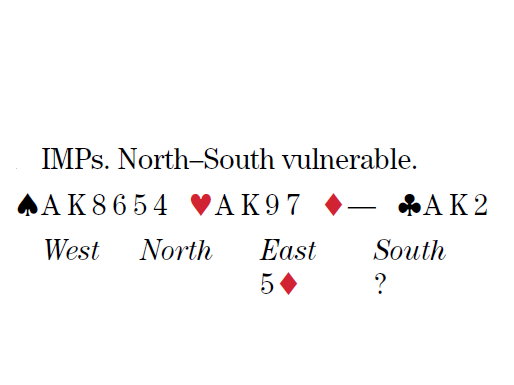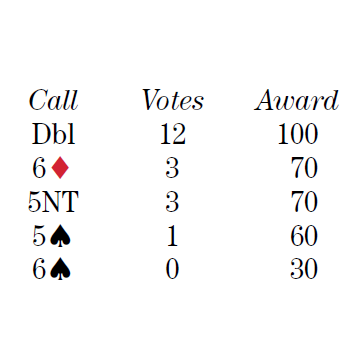
What’s your call?
| 5♥ | 5♠ | 5NT | ||
| 6♣ | 6♦ | 6♥ | 6♠ | 6NT |
| 7♣ | 7♦ | 7♥ | 7♠ | 7NT |
| Dbl | Pass |
It’s only IMPs and that is all
The panelists uniformly despise this problem. And they’re right — it wasn’t a very nice thing for us to do. Thank goodness it’s only a bidding contest and not real life.
With that said and done, the vast majority enter the proceedings with a double.
“Where is our lucky coin? ” ask the Sutherlins. “Double will probably end the auction. We hope to hold East to eight diamond tricks, which means we will be plus 500. But if partner pulls our double, we will know it’s because of length, not strength. Slam will be odds on. Whereas, if we bid 6♦ and catch partner with no major, we are likely going down. Settle for a plus score.”
Hamstrung, Boehm doubles and sighs. “This won’t do as well as getting to the right slam (if there is one), but will gain many IMPs over those who reach the wrong slam. 5♠ doesn’t accomplish much and might even go minus against the likely bad splits.”
“Unfortunately, partner rates to leave this double in,” bemoans Cohen. “He removes only with good shape. It’s tempting to take a shot, but I’d probably have to insist on spades, with bad breaks likely looming.”
Lawrence calls it “a nasty hand with extra difficult shape.” He doubles: “It’s way too dangerous to guess that some number of spades is right. If partner takes the double out, he promises some values (with weak hands, he passes, and we hope to set 5♦). If partner bids 5♥ or 5♠, we will continue with another guess, but knowing partner has something.”
“I would prefer to be demanding a removal of my double with such an offensive hand,” says Hampson, “but my alternatives are to unilaterally select our trump suit or make a distorted takeout bid like 5NT or 6♦ and risk playing a 4–3 instead of a 6–3. Also, facing no real fit, this could be our last plus. I am tempted to raise any bid partner makes to seven.”
If Colchamiro’s partner bids over the double, he’d better be ready to play the grand. “If partner pulls, partner will have a long suit, and that’s all I need for 13 tricks. So if he bids 5♥,I bid 7♥. If 6♣, I’ll chance 7♣, and if 5♠, 7♠.”
Rigal cuebids 6♦, planning to convert 6♥ to 6♠ suggesting a hand suitable for play in some other strain. “I will apologize in advance for bidding this way, but it’s only IMPs …”
Kennedy takes the 6♦ approach as well. “5♠ could easily be correct, but that would not disclose the full value of my hand. A double is more likely to be left in at the five level.”
Falk justifies bidding 6♦ this way: “I’m going to have to correct 6♥ to 6♠, but I don’t see bidding less than 6♠ anyway, and I’m too good to just bid 6♠ straight off. Partner will eventually figure out that I have some grand slam interest and majors (I could bid 5NT with the round suits reversed) and that’s the best I can do. This hand is just too good to double — partner will almost surely have to pass, and there’s no absolute guarantee that I can beat 5♦!”
Stack bids 5NT to ask partner to pick a slam. “I’m showing a monster hand and suggesting at least a small slam and possibly a grand slam. If partner bids 6♣, I will have to decide whether to pass or bid 6♠ and hope for the best.”
Weinstein bids 5NT, intending to pull 6♣ to 6♦. “This should emphasize spades, since we would bid 6♦ directly with equal length in the majors, or pull to 6♥ to emphasize hearts. This problem gave me a headache.”
“Ugh,” grunts Meyers in flawless bridgespeak. “I think if I double, it will go all pass when partner has ♥Q x x x x and we would be cold for
a slam. I think I am going to bid 5NT and over 6♣, bid 6♥, hoping partner will play me for longer spades since I
didn’t bid 6♦ directly.”
Walker settles for 5♠. “Preempts really do work.”
Meckstroth (“impossible problem”) selects to play the abstain card from his bidding box. (Note: Do not try this at home.)


